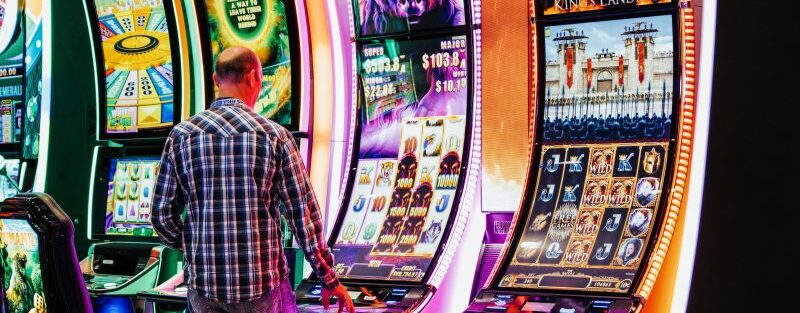Casinos India – President Donald Trump threw his weight behind a bipartisan House bill last week that asserts the Mashpee Wampanoag tribe’s claim to 321 acres of land in Massachusetts.
The Mashpee Wampanoag Tribe Reservation Reaffirmation Act, or H.R.312, had the support of both Republicans and Democrats. Supporters of the law said the promise to the 2,600-member tribe was to protect federally recognized land sovereignty and protect the tribe’s economy by allowing the tribe to build casinos on the land.
Casinos India

The House voted in favor of the bill, moving the tribe one step closer to building a proposed $1 billion casino on the land. But the president’s opposition is calling for an investigation into the casino magnate and his past ties to the gambling industry. The bill now moves to the Republican-controlled Senate.
Senate Bill Would End Union Rights For Indian Casino Workers
Trump announced his opposition to the bill in a tweet on May 8, calling it a “special interest casino law” and urged Republicans to back off and asked the House to temporarily postpone a vote. The president has a long history of challenging the right of tribes to build and operate casinos on reservations.
The chaos that ensued over the legislation exposed the gambling industry’s complicated and expensive tug-of-war over casino regulations on tribal lands. This is not the first time interest groups, lobbyists or the president have challenged the tribe’s protected federal status as a sovereign nation to block the construction of a competing casino.
A lot of money is being poured into the political arena everywhere. Last year, gambling groups spent a combined $32.53 million, including more than 300 lobbyists. The Gila River Indian Community in Arizona led the community with spending of $2.58 million. Federal lobbying by the gambling industry increased by a whopping 112 percent between 2000 and 2018.
Federally recognized tribal peoples have the right to self-determination and the ability to control their own internal affairs on reservations, including building casinos in many US states.
What’s Behind Lobbyist Attempts To Block Casinos On Indigenous Land? • Opensecrets
Some tribes must enter into treaties or agreements with states before building casinos. These states then claim the casino profits. Established in 1988, the National Gaming Commission of India is also tasked with monitoring casinos in reservations.
The ambiguity that comes with federal oversight has often led to tensions between casinos, Congress and tribal nations over what rules to play by. Lobbyists play an important role in specifying the rules.
The Mashpee Wampanoag were the first indigenous people to come into contact with colonists in the seventeenth century. Of the 69 tribes that once made up the Wampanoag Nation, the Mashpee Wampanoag are one of only three surviving after decades of colonization and genocide. Despite a history of more than 12,000 years, the tribe lives without reservations.

The US government did not recognize the Mashpee as a Wampanoag tribe until 2007, after the Indian Reorganization Act of 1934 was passed. Last year, then-Interior Secretary Ryan Zinke ruled that the Interior Department could purchase 150 acres of land in Mashpee and Taunton, Mass. The Mashpee Wampanoag will not designate 170 acres of land here, reversing an Obama-era decision.
Best Partners Launches Bodog India Online Gambling
“If a federally recognized tribe does not have land to exercise tribal authority, what administrative authority do you have?” said Kathryn Rand, dean and law professor at the University of North Dakota. “You have to have a place to use that power.”
Rand, who co-founded the Institute for the Study of Tribal Gaming Law and Policy, said the revoking of the tribe’s land was a major blow to their planned casino and disrupted the economy.
“The gang started working on his casino, which also involved financing,” he said. “When the [DOI] secretary changed his mind, the tribe was left with enormous debt.” He estimated the debt at $440 million.
The Mashpee Wampanoag tribe saw the proposed casino as a major “economic driver.” Casinos can generate revenue needed for public services and other essential reservation infrastructure, sometimes accounting for a significant portion of a tribe’s revenue.
National Indian Gaming Commission Set To Announce Tribal Casino Revenues
This is not the first time that the Congress has taken a step in favor of removing the reservation of a tribe.
In 2015, the Gun Lake Tribe went through a similar struggle. Congress introduced the Gun Lake Trust Land Reaffirmation Act and ultimately granted that the land could be placed in a federal trust, but not without accession. The Supreme Court finally accepted this decision as constitutional in 2018.
Steven Light, co-founder of the Institute for the Study of Tribal Gaming Law and Policy and a professor at the University of North Dakota, said that “it’s not the best thing for Congress to create bills that are specific to one tribe or another because it implies that sovereignty [was] violated. can be] and it can be politicized.” Instead, it is the DOI’s responsibility to fulfill the federal government’s promises to all tribes, he said.

Lobbyists representing Twin River Worldwide Holdings welcomed the DOI’s decision to withdraw land formerly considered the Mashpee Wampanoag Reservation. Rhode Island has two privately owned casinos near the disputed site – the Twin River Casino Hotel and the Tiverton Casino Hotel. Rep. Tom Cole (R-Okla.), who co-sponsored H.R.312, said competition from new casinos has hurt Twin Rivers, according to the Washington Post.
Revenue Growth Seen Slowing At Indian Casinos
Twin River paid Revolving Door lobbyist Matt Schlapp, president of the American Conservative Union and staunch Trump supporter. The opposition’s ties to Trump have deepened. Based on findings published by the Washington Post, the Twin Rivers president once served as CEO of a Trump-owned casino in Atlantic City.
Schlapp runs the lobbying firm Cove Strategies, which was paid $30,000 in 2019 by Twin River Management Group to lobby on the bill. Schlapp’s wife, Mercedes, serves as director of strategic communications at the White House.
Twin River Management Group also gave $30,000 to Black Diamond Strategies. Although there is no record of him lobbying, H.R. On 312 Topics, revolving door lobbyist Rick Wiley is a political consultant at Black Diamond Strategies and has played an influential role in the Trump campaign. Political director during the presidential election. Former Trump campaign strategist Doug Davenport also lobbied for Black Diamond Strategies.
Rep. Keating took to Twitter last week to announce Trump’s “well-documented alliance with [Rhode Island] casino lobbyists.”
Fbi Could Raid Alabama’s Indian Casinos, Says Gambling Expert
Tribes have also increased their involvement in federal lobbying. The Mashpee Wampanoag Tribe spent $150,000 on lobbying this year. Last year they spent $420,000.
“In the American political system, money talks,” Prakash said. “Political responsiveness stems from access and influence linked to financial resources and lobbying.”
In testimony last month before the US House Subcommittee on Indigenous Peoples, Mashpee Wampanoag Vice President Jesse “Little Doe” Baird said the loss of Mashpee Wampanoag status has devastated their economic development.

“The losses our tribe has suffered over the years, which calls into question our reservation status, are beginning to reach catastrophic levels,” Baird said.
India Online Casinos For 2023
When the Mashpee Wampanoag tribe was denied land rights in the mid-20th century, when the federal government terminated the status of numerous American Indian tribes and revoked existing promises to treaty tribes, Rep. Raul Grijalva (D-Ariz.) said on the House floor.
Still, money from casinos isn’t a panacea for the financial woes many tribal people face. Some indigenous leaders have called for alternative revenue streams given the limitations of the gambling industry.
Also, not all tribal nations have casinos. According to 2016 data from the NIGC, about 42 percent of the 567 federally recognized tribes operate gaming facilities. That means most — 329 tribes — don’t have casinos.
Not all casinos are created equal and profits vary greatly by location and tribe. Of all gambling revenue audits the NIGC received in 2017, 57 percent of casinos grossed less than $25 million.
India Casino Theme. Aces In Poker Game, Cards And Chips On Red Table With National Flag Background. Gambling And Betting Stock Photo
The Mashpee Wampanoag Tribe isn’t the only tribe with problems with DOI and lobbyists.
Last year, the Mashantucket Pequots Tribe filed a lawsuit against the DOI and MGM Resorts International, accusing the agency of intentionally delaying any decision on the proposed casino. This will be the third casino owned by the Mashantucket Pequot Tribe. The Mohegan tribe, located in Connecticut, also joined the lawsuit.
MGM Resorts International, a company planning to build a casino in Springfield, Mass., lobbied against the Mashantucket Pequots’ proposal to build and may have influenced DOI’s apparent decision, according to an examination of Zinke’s calendar. via Politico.

Judge Rudolph Contreras allowed the lawsuit to proceed in February, saying “Plaintiffs have made a credible case that significant political pressure was brought to bear on this issue and that the Secretary may have improperly bowed to such pressure.”
Shutdown Of Tribal Casinos Deals Blow To Indian Country
MGM Resorts International spent a record $1.9 million lobbying on gambling-related issues in 2018, up from $570,000 just two years ago. The company paid Ballard $80,000 during the first quarter of this year. last year,
List of casinos in india, michigan casinos, best casinos, online casinos, legal casinos in india, money casinos, new casinos, are there casinos in india, pennsylvania casinos, the casinos, casinos bonus, casinos



